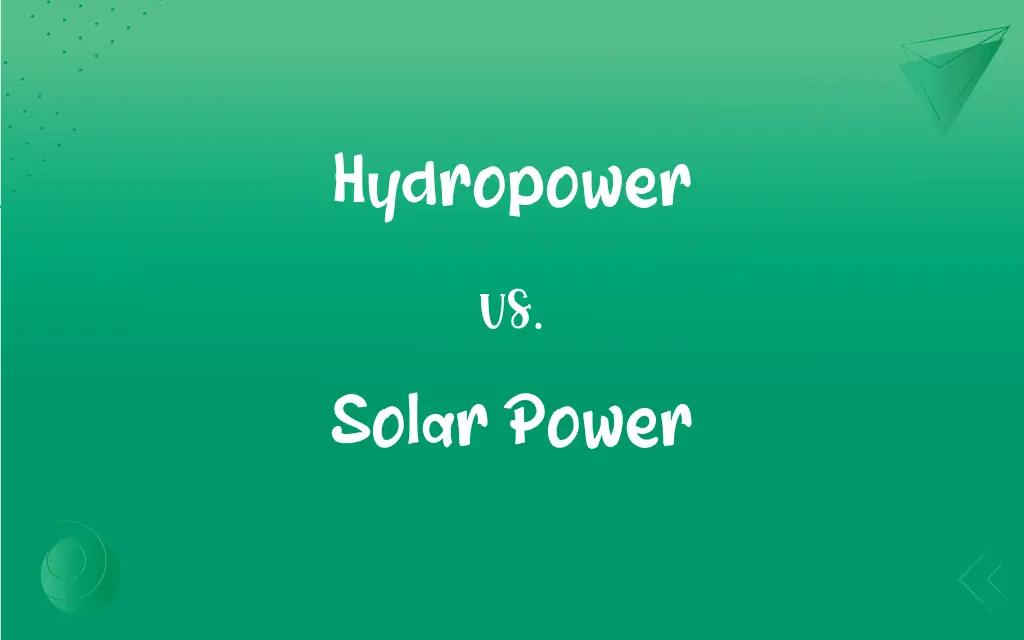Hydropower vs. Solar Power: What's the Difference?
Edited by Janet White || By Harlon Moss || Updated on October 11, 2023
Hydropower generates electricity using flowing water, while solar power utilizes sunlight. Both are renewable energy sources but leverage different natural elements.

Key Differences
Hydropower is a form of energy derived from the movement of water. Its functionality leans significantly on the gravitational force of falling or streaming water to generate electricity. This utilization of water necessitates a substantial, consistent water source, thus confining the geographical positioning of hydropower plants. Meanwhile, solar power harnesses energy from the sun, utilizing photovoltaic cells to convert sunlight into electricity, making the sun an indispensable component.
Contrasting solar power with hydropower, solar installations are frequently identified on rooftops of structures and in vast solar farms, showcasing its geographical flexibility. The sun, available universally, only demands a panel positioning that maximizes sunlight exposure. Hydropower, conversely, demands a robust water flow, often utilizing dams to regulate and direct water through turbines, which generate electricity. This method involves the meticulous planning and development of extensive infrastructure around large bodies of water.
Solar power, while flexible, does have limitations like dependency on weather conditions and daylight availability. The efficiency of solar power generation can be notably impacted by cloud cover, pollution, or other obstructions to sunlight. In contrast, hydropower is capable of continuous electricity production, as water flow is generally less subjected to sudden disruptions, and certain setups, like pumped storage, even allow for controlled water release, ensuring stable power generation.
On an environmental note, hydropower has drawn criticism for its potential impact on aquatic ecosystems. The alteration of water flow and the introduction of large infrastructures into water bodies can affect the habitats of numerous aquatic species. Solar power also faces environmental scrutiny, particularly regarding the land use for large solar farms and the materials and energy used in manufacturing solar panels, albeit it does not inherently disrupt existing ecosystems to the same extent as hydropower installations.
Lastly, in a financial and logistical context, the installation of solar power systems can be achieved with considerably lower initial investment and in more varied locations than hydropower. While both energy sources are pivotal in our transition towards renewable energy, the appropriateness of each is substantially determined by regional, environmental, and logistical factors.
ADVERTISEMENT
Comparison Chart
Energy Source
Flowing water (rivers, streams)
Sunlight
Dependency
Requires a consistent and robust water source
Dependent on weather conditions and daylight
Environmental Impact
Can disrupt aquatic ecosystems
Minimal disruption, concerns about materials and land use
Geographical Limitation
Limited to areas with significant water bodies
Highly adaptable across various regions
Installation Cost
Generally high due to extensive infrastructure
Varies, but can be notably lower and scalable
ADVERTISEMENT
Hydropower and Solar Power Definitions
Hydropower
Hydropower can offer continuous power generation due to the persistent flow of water.
Unlike solar, hydropower can produce electricity uninterruptedly, even at night.
Solar Power
Despite being clean and sustainable, its effectiveness is influenced by weather and daylight conditions.
On overcast days, the efficiency of generating electricity with solar power may be reduced.
Hydropower
It can potentially impact aquatic ecosystems due to alterations in water flow and habitats.
Critics argue that hydropower plants can endanger fish populations by altering their migration routes.
Solar Power
It's a renewable energy source that can be harnessed wherever sunlight is available.
Even in remote locations, solar power provides a viable option for electricity generation.
Hydropower
Hydropower translates the kinetic energy of moving water into electricity.
The river's robust current provides ample kinetic energy for hydropower generation.
Solar Power
Solar power installations, while having upfront costs, can provide long-term savings and energy independence.
By investing in solar power, the company significantly reduced its long-term electricity expenses.
Hydropower
It often involves the construction of dams to regulate water flow through turbines.
The massive dam channels water effectively, enabling consistent hydropower production.
Solar Power
Solar power systems can be installed in various scales and configurations, like solar farms or rooftop panels.
The vast solar power farm spans acres, hosting numerous panels to maximize energy production.
Hydropower
Hydropower is often used for grid stability due to its reliable and controllable electricity production.
The stability offered by hydropower enables the grid to manage demand effectively and ensure constant supply.
Solar Power
Solar power converts sunlight into electricity using photovoltaic cells.
The house obtains its electricity by utilizing solar power from panels on the roof.
Hydropower
Hydroelectric power.
Hydropower
Hydroelectric power
FAQs
Can hydropower be used for small-scale applications?
Yes, small-scale hydropower systems, like micro-hydro installations, are feasible in suitable locations.
Is hydropower dependent on weather?
Hydropower is less influenced by weather compared to solar, but water availability and seasonal changes can impact it.
What is the lifespan of a hydropower plant?
Hydropower plants have extensive lifespans, often exceeding 50-100 years with proper maintenance.
How do solar power plants impact the local environment?
Large-scale solar farms require substantial land use, but generally have lower environmental impact than many other energy sources.
What is the largest hydropower plant in the world?
The Three Gorges Dam in China is currently the largest hydropower plant globally.
What countries lead in solar power production?
China, the United States, and Germany are among the leading countries in solar power generation.
Can hydropower be utilized for off-grid applications?
Yes, off-grid hydropower systems can provide electricity to remote locations with suitable water sources.
Are hydropower plants environmentally friendly?
While hydropower emits no greenhouse gases during operation, dam constructions can impact local ecosystems.
How long do solar power systems typically last?
Solar power systems typically last between 25-30 years, but many continue to produce power beyond that.
Can hydropower plants store energy?
Some, like pumped-storage hydropower plants, can store energy by pumping water back to higher elevations.
Can hydropower be developed in arid regions?
It's challenging due to the scarcity of robust, flowing water sources necessary for electricity generation.
How does solar power generate electricity?
Solar power utilizes photovoltaic cells to convert sunlight into electricity.
Can I install a solar power system in my home?
Yes, residential solar power systems, such as rooftop solar panels, are popular and accessible.
Is solar power entirely clean and green?
While generating power without emissions, concerns may arise from manufacturing and disposing of solar panels.
Can solar power be stored?
Yes, solar power can be stored in batteries for use during non-sunny periods, enhancing its utility.
Is hydropower widely used globally?
Yes, hydropower is a prominent energy source worldwide, especially in regions with abundant water resources.
Is solar power viable for large-scale energy needs?
Yes, large-scale solar farms are increasingly used to meet significant electricity demand in various regions.
What is hydropower?
Hydropower generates electricity by converting the kinetic energy from flowing water.
How does weather affect solar power?
Weather conditions, especially cloud cover, directly affect solar power's electricity generation efficacy.
What are the key advantages of solar power?
Solar power is clean, renewable, and can be installed in varied locations, from remote areas to urban rooftops.
About Author
Written by
Harlon MossHarlon is a seasoned quality moderator and accomplished content writer for Difference Wiki. An alumnus of the prestigious University of California, he earned his degree in Computer Science. Leveraging his academic background, Harlon brings a meticulous and informed perspective to his work, ensuring content accuracy and excellence.
Edited by
Janet WhiteJanet White has been an esteemed writer and blogger for Difference Wiki. Holding a Master's degree in Science and Medical Journalism from the prestigious Boston University, she has consistently demonstrated her expertise and passion for her field. When she's not immersed in her work, Janet relishes her time exercising, delving into a good book, and cherishing moments with friends and family.































































